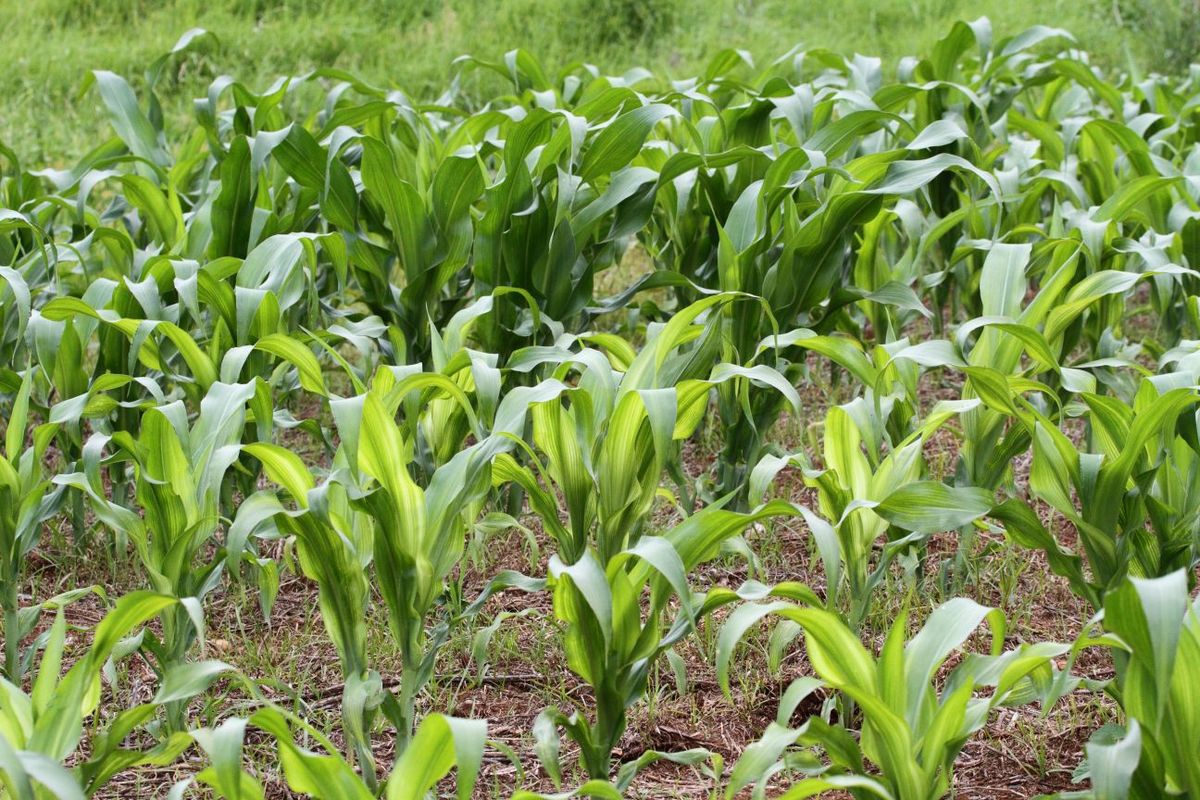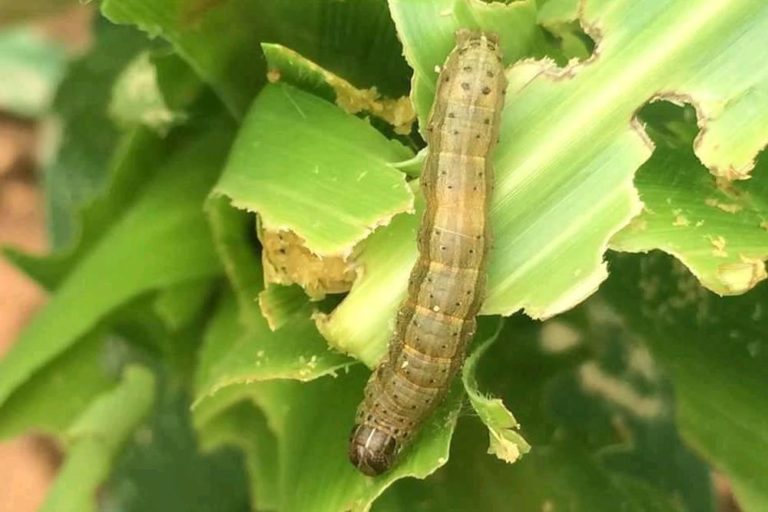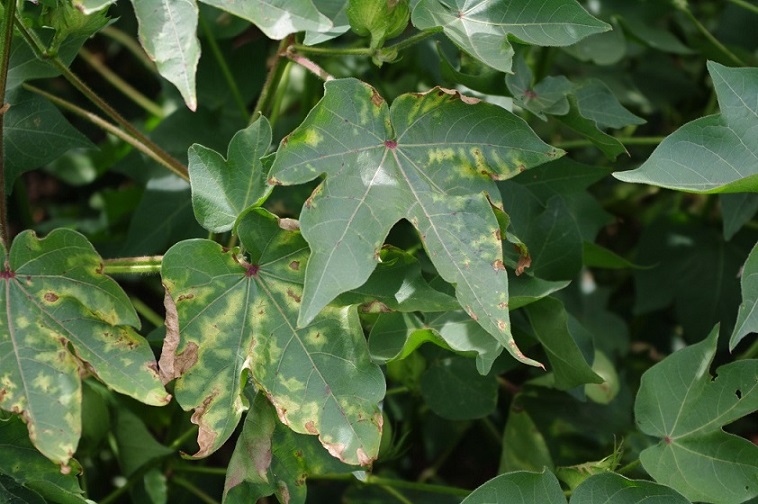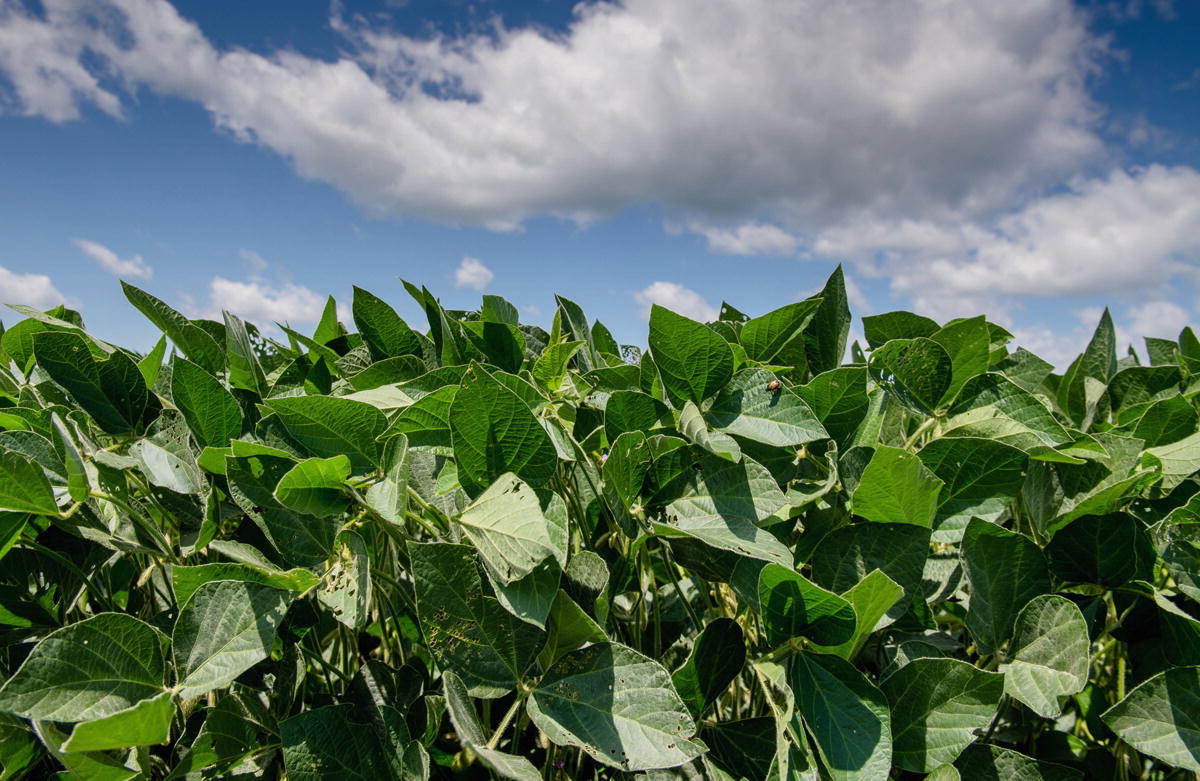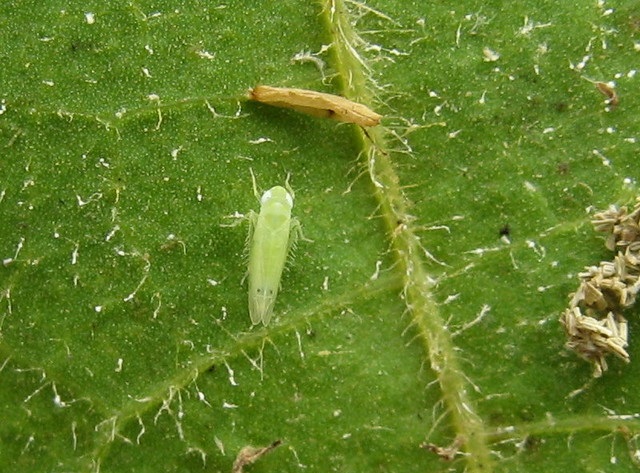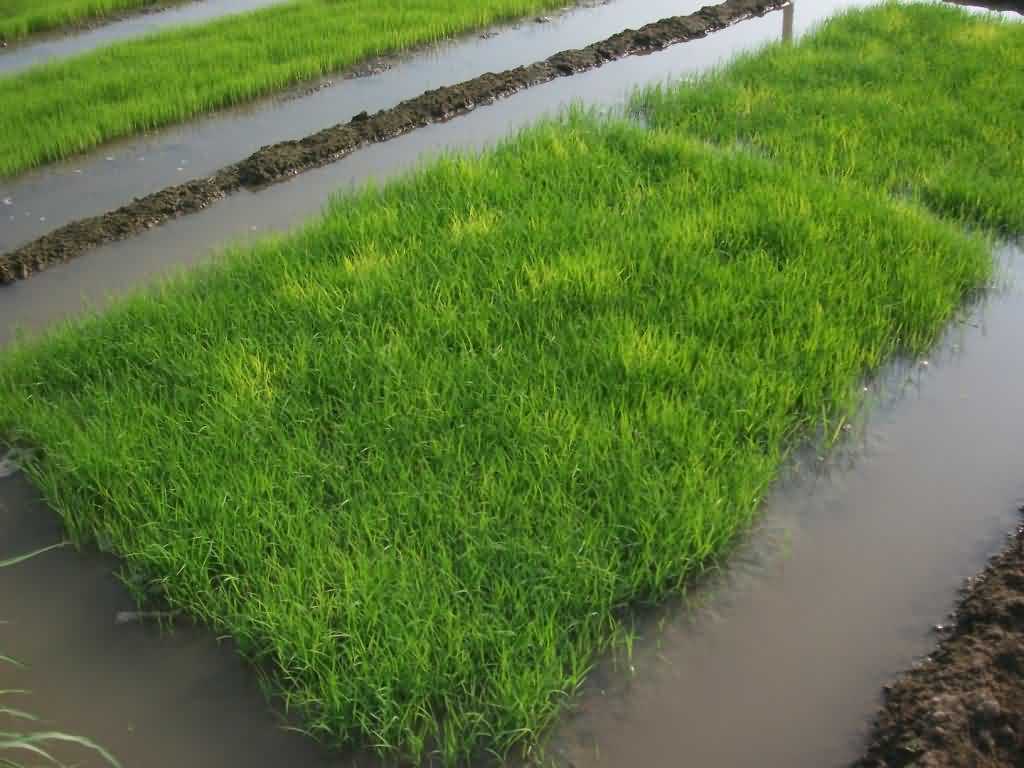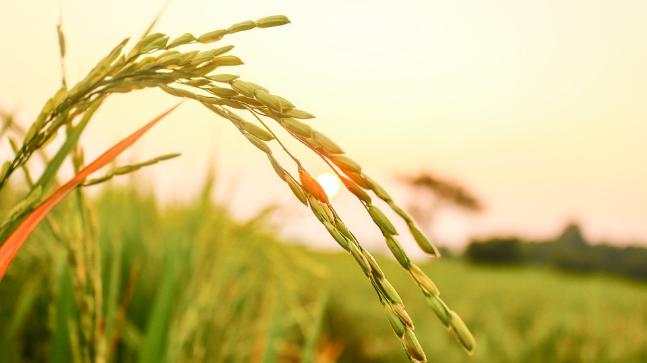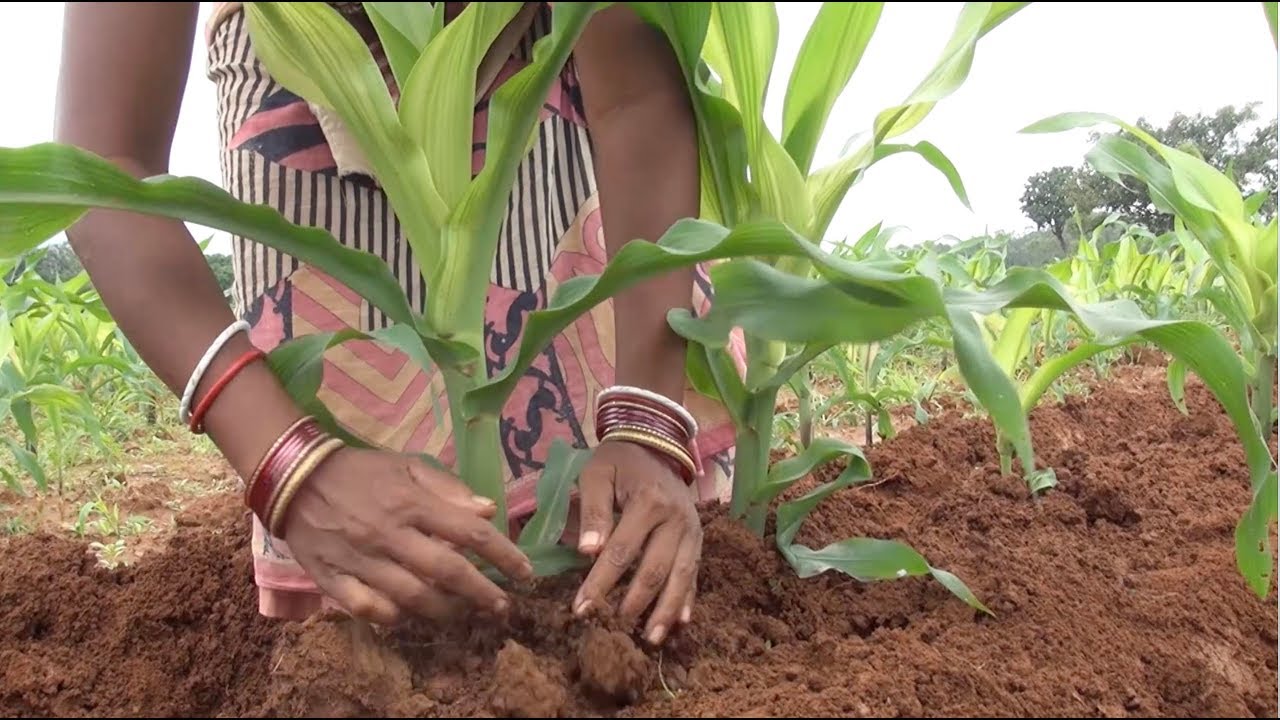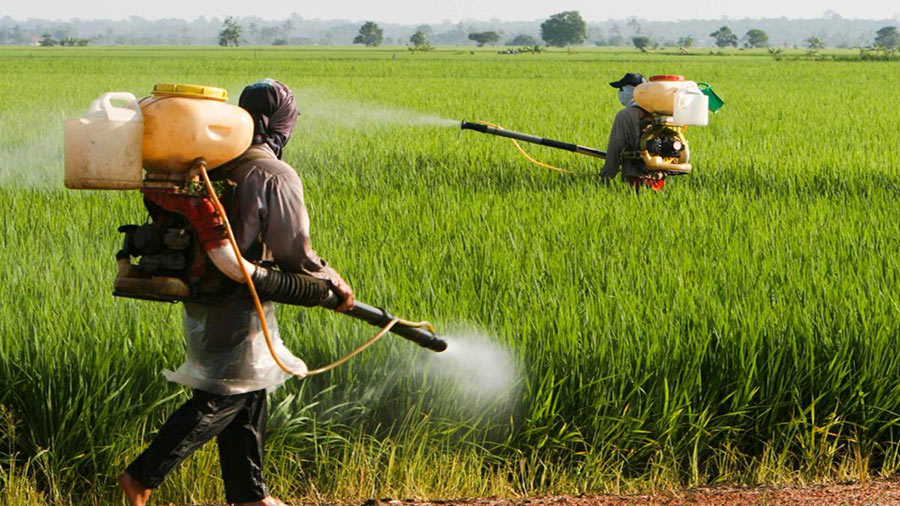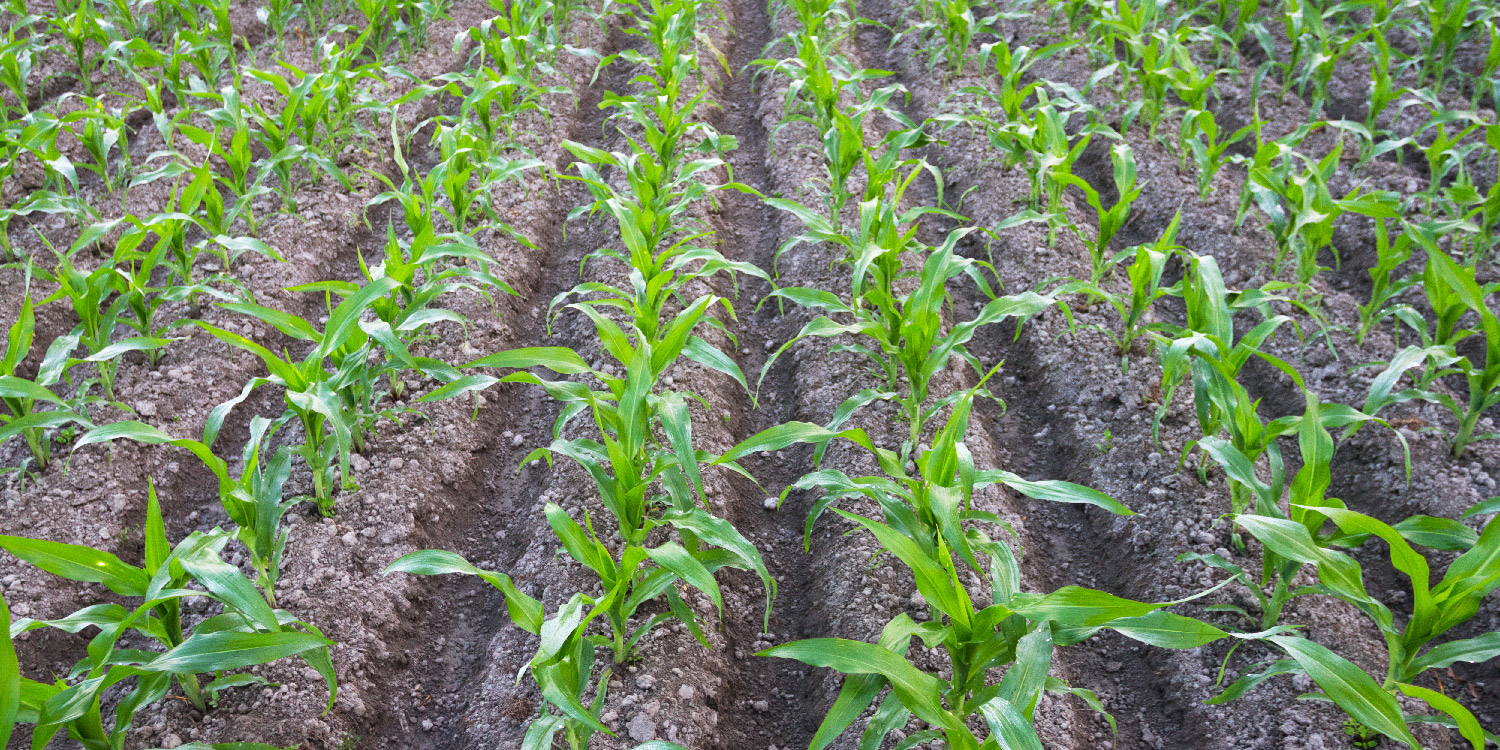- Zinc is needed for the growth of maize crops and good yield. These nutrients are obtained from the soil.
- An important role in hormone modification required for fungal growth and reproductive functions of zinc plants in maize
- Lack of zinc in maize causes white bud disease.
- Zinc plays an important role in the formation of a hormone called indole acetic acid that determines plant growth.
- Essential for catalytic and metabolic activities in various metallic enzymes in plants
- Symptoms of zinc deficiency occur on the medium leaves of plants. Excess zinc deficiency causes new leaves to become white. Appears in white spots between the veins of the leaves.
- Zinc indirectly participates in protein synthesis and water absorption in plants
- Its involvement in the manufacture of plant genetic material ribonucleic amal.
Management of Fall Armyworm in Maize
- This insect hides in piles of soil, straw, weeds during the day, and eats crops overnight. Its number can be seen significantly in the affected farm/crop. This pest tends to eat very fast and can affect the entire field crop by eating in a very short time. Hence management/control of this pest is necessary.
- The armyworm attacks the crop in groups together and cuts off the leaves or other green parts of the crop at night and in the day it hides under a crack or lump in the field or under a dense crop shade. lives.
- In areas where the number of fall armyworm pests is high, spraying of any of the following insecticides should be done immediately.
- Pre-sowing soil treatment: In the maize crop, fall armyworm is managed by soil treatment, for this, Bavaria bassiana should be mixed with 50 kg FYM at the rate of 250 gram/acre and broadcast in an empty field.
- Spraying: Lemdashelothrin 4.6% + chlorantraniliprole 9.3% ZC 100 ml / acre, or chlorantraniliprole 18.5% SC @ 60 ml / acre, or emamectin benzoate 5% SG @ 100 gram / acre + Bavaria bassiana @ 250 gram/acre
- In areas where its number is less, in those areas, keep the farmer on the ridge of their fields and place a small pile of straw in the middle of the field. In the sun, the armyworm (soldier moth) hides in these straw piles in search of shade. In the evening these straws should be collected and burnt.
Wilt management in cotton
- Wilt disease is a growing soil-borne disease in cotton production areas.
- It can be difficult to differentiate other diseases and wilt.
- In young and grown plants, the first symptom is the yellowing of the edges of the leaves and the area around the veins i.e. the discoloration begins at the margin and spreads towards the roots and stems and midribs. The leaves loosen their torsion, gradually turn brown, dry up and eventually fall. To prevent this disease, soil treatment, and seed treatment are very important.
- This disease is caused by cold temperatures and wet soil during early vegetative growth, plants are infected during the early reproductive stages, but symptoms appear later.
- Fungicide is used for the prevention of this disease.
- Carbendazim 12% + Mancozeb 63% WP 2.5 gram / kg seed or Carboxin 37.8% + Thyram 37.8% 2.5 gram / kg seed. Treat seeds with.
- Spray kasugamycin 5% + copper oxychloride at the rate of 45% WP @ 300 gram / acre or thiophanate methyl 70% WP 500 gram / acre.
- Use of Bacillus subtilis / Trichoderma viride @ 500 gram / acre or Pseudomonas fluorescens @ 250 gram / acre in biological treatment. These fungicides are used as soil treatment and seed treatment.
- In the case of more problems, decomposers can also be used before sowing the crop in an empty field.
Sulfur utility in soybean crop
- Sulfur is essential for soybean production, and some farmers are facing a shortage of sulfur due to its low consumption.
- Sulfur contributes significantly to the manufacture of protein and oil in soybean crops.
- Aids in the manufacture of foliage in sulfur leaves.
- Sulfur increases the reactivity of enzymes in plants.
- Symptoms of sulfur deficiency first appear on new leaves, which persist even after giving nitrogen.
- The new leaves turn yellow.
- The crops ripen relatively late and the seeds are not able to mature properly.
- In the soybean crop, the bales located in the crops do not grow properly, due to which the natural nitrogen process is adversely affected.
Management of aphids and jassids
- Aphid and jassid is an insect sucking pest of jacid crops. They are very small in size. Their shape is like the tip of a lentil. It is usually yellow-green or white with dark spots on its front wings. Jassids fly away when there is a slight movement on the crop. In crops, these kits suck the juice from the leaves and under the buds of the leaves.
- For control of aphid and jassid, Imidacloprid 60% FS or Thiamethoxam 30% FS with 10 ml/kg seed should be given. This seed treatment keeps the crop free from sucking pests for one month.
- Spraying of imidacloprid 17.8% SL @ 100 ml / acre or acetamiprid 20% WP @ 100 gram / acre or acephate 50% + imidacloprid 1.8% SP @ 400 g / acre.
Biological Treatment:
- Bavaria Basiana should be sprayed at the rate of 1 kg per acre.
- Spraying of metrazium at the rate of 1 kg per acre
Preparation and sowing of paddy nursery
- Paddy should be planted in a field that is near the source of irrigation.
- After the first rainfall in May-June, the ground should be leveled by running the field in the field chosen for the nursery. To prepare the plant, fill two to three cm of water in the field and plow it two or three times. So that the soil becomes leached and weeds are destroyed. After the last plowing, plow the field by planting the stock. So that Leh is well-formed in the field, which will help to uproot the plant for planting and to reduce the loss of roots.
- To prepare the plants, make 1.25 m wide and 8 m long beds and use 10 kg/sqm FYM and micronutrients 100 gram/sqm per bed (10 sqm).
- Keep in mind that the healthier the nursery, the better the yield.
- Seed quantity – Transplanting of the one-acre area required 12-13 kg of fine rice varieties, 16-17 kg of middle grain varieties, and 20 to 30 kg seed seeds of coarse grains. is. While hybrid species require 7-8 kg of seeds per acre.
- Chemical Seed Treatment – Firstly soak the seeds in water for 12 hours and before sowing in the nursery seed the seeds of Carbendazim 12% + Mancozeb 63% WP 2.5 gram/kg seed or Carboxin 37.8% + Thyram 37.8% 2.5 gram/kg seed.
- Biological treatment: – Trichoderma viride + PSB 10 gram + 5 gram / kg seed or Pseudomonas fluorescens + PSB 10 gram + 5 gram / kg seed
- Nursery maintenance – irrigate seedlings in the nursery after two or three days of sowing. Spraying Fipronil 5% SC 30 ml / pump + Kasugamycin 5% + Copper oxychloride 45% WP 20 gram / pump + Humic acid 10 gram / pump nursery.
This year farmers can produce record rice
This year farmers can produce record rice
This year farmers of the country can produce a record in rice production. The reason behind this is being told by the government to increase the price of paddy and the possible good monsoon rains, due to which farmers are sowing paddy on a large scale. Due to this, there is likely to be a record increase in rice production in the country.
On this issue, the President of Rice Exporters Association of India BV Krishna Rao said that “farmers are interested in growing paddy. They are likely to expand due to government support. In the new marketing year we can produce 120 million tonnes. The government has increased the price at which it will buy new season rice from farmers.”
Nitin Gupta, vice-president of Olam India, said on the subject that “rising global prices, good monsoon rains and increasing exports are encouraging Indian farmers to plant more rice”. Gupta said that unlike its rivals, India has a large surplus for exports and it will grow further in the new season.
Source: Fasal Kranti
ShareMaize Varieties
- 6240 Syngenta:- They remain green even after maturity, due to which they are suitable for fodder, high yield, grains are semi dent type. Those which are filled to the end in the corn, grow in an adverse environment. Stocks and roots are resistant to rot and rust diseases.
- Syngenta 6668:-Suitable for the irrigated area, high yield potential, large corn which is full till the end.
- Pioneer 3401/Pioneer 3396:- It is a high yielding hybrid variety of the Kharif and Rabi seasons and its plant structure is suitable to give it a higher yield even on more dense sowing.
- Dhanya 8255:-Tolerant to moisture stress, may be used for fodder purposes Good Husk cover and excellent standability, best performance even at 26000 plants/acre plant number.
- NK-30:-Adaptable to tropical rain, ability to withstand stress/drought conditions, dark orange grains with excellent tip filling, high yield, adaptable to fodder.
- The crop duration of all these varieties is 100-120 days and the seed rate is 5-8 kg/acre.
Share
Precautions to be taken while using weedicide
- Weedicide is the ultimate need of modern agricultural science. Weed control by weedicide control is more economical by laborers, mechanics.
- Farmers should keep in mind the following things before selecting weeds.
- Be sure The weedicide you use may or may not be used for many weeds.
- Before buying weedicide, the date of its production and method of use should be read carefully.
- Before spray, keep in mind that only a specified amount of weedicide is used.
- in the initial stage of crops during the usage of weedicide by placing a hook on the pump so that the weedicide is not sprayed on the crops while this crop is saved from burning.
- If there is a suggested weedicide according to the crop, then use the same on that crop.
- Do not mix weedicide with any insecticide and fungicide.
Weed Management in Maize
- In the early stages of maize, crop Weeds cause damage. Therefore, it is necessary to do extracting.
- Weeds are destroyed by using weedicide before germination on the second or third day of sowing.
- Maize weeds are generally in the form of annual grass and narrow and broad leaves.
- we can use following weedicide in maize
- Spraying of Tembotrione 42% SC @ 115 ml / acre (in 2-3 leaf stage) or Topramezone 33.6% SC @ 30 ml / acre (in 2-3 leaf stage).
- Spraying 2,4 D @ 400 ml / acre (20-25 days after sowing).
- Spray Atrazine 50% WP @ 500 gram / acre (3 to 5 days later).
- If pulses crops are to be grown as intercrop, do not use atrazine. In its place, spraying Pendimethalin @ 800 ml/acre.

